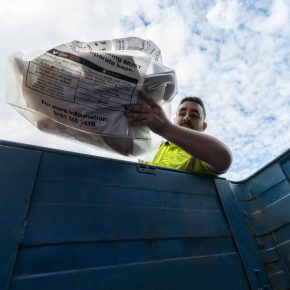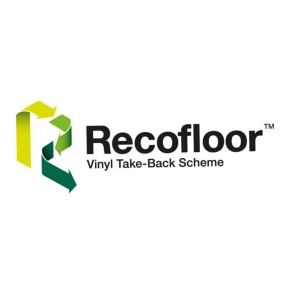
Recofloor: Moving towards a circular economy in the construction sector
Growing interest in environmental issues is putting pressure on the construction sector to move towards a circular economy with greater emphasis on the sustainable recovery of waste materials. Carla Eslava, Manager of the Recofloor commercial waste vinyl flooring collection scheme, discusses the issues and offers some solutions.

“In the construction sector, what happens to many products at end-of-life is typically not considered due to their longer lifespans and the need for them to meet strict technical performance criteria.
The construction industry is the UK’s biggest consumer of natural resources. According to DEFRA, an estimated 120 million tonnes of construction, demolition and excavation (CD&E) waste was produced in 2016. While their statistics indicate that 92% of non-hazardous construction and demolition waste was recovered in some form (55 million tonnes) in 2016, nearly 5 million tonnes (8%) of non-hazardous construction and demolition waste was landfilled.
Waste is generated during the construction and installation phases and when products reach the end of their life. While many materials, such as PVC and metals, are recyclable, the construction sector is a challenging diverse environment for waste management and requires a heavy reliance on engaging with contractors to collect these recoverable resources.
Capturing waste at the installation phase should always be done where possible as the material is clean, we know what exactly is in it and this improves the chances it can successfully be turned back into new products. End of life waste is more challenging, and more work will be needed in the future to establish effective recycling techniques and end markets for the recyclates.
For installation waste, a great example of circular construction is the Recofloor scheme that offers a sustainable collection service for commercial waste vinyl flooring generated from refurbishment and new build projects, including live project sites. The scheme accepts both installation offcuts and uplifted smooth and loose lay vinyl, as well as Luxury Vinyl Tiles (LVTs) and safety offcuts and roll-ends.
Since its 2009 inception, the scheme has diverted more than 6,000 tonnes of waste vinyl flooring from landfill for use in new vinyl flooring or other useful products. The scheme continues to expand as more flooring companies recognise the environmental value – and reduced disposal costs of up to 70% – of recovering recyclable resources.
By capturing more waste at the installation phase and developing a viable recycling route, it is more likely in the future we will be able to develop more solutions for end-of-life construction waste.
Moving towards ‘circular construction principles’ still presents many challenges, such as the collection of materials on a busy site with lots of different contractors, transportation, a lack of sorting infrastructure and limited end markets.
For example, Recofloor relies on the efforts of individual contractors to help return the vinyl flooring for recycling. Without effective communication and their willingness to participate, it would not be possible.
But as a successful and growing scheme, Recofloor shows it can be done, with a focus on installation offcuts versus end-of-life/uplifted material. The latter is still a challenge that needs to be addressed in the future.”
Richard McKinlay, Head of Consulting at resource recovery specialist Axion, comments: “If we can tackle installation waste, that is where we really need to focus our efforts initially to get the material coming back. If you build up that system, then you start to build infrastructure which could then allow end-of-life material to enter it eventually.”
Typically, the development of recycling infrastructure starts with reusing production waste first as this is the ‘purest’ material to put back into the manufacturing process. Attention then turns to clean scrap materials, followed by the more difficult post-consumer waste as recycling techniques become more advanced.
For the construction sector to move towards more circular sustainability, we will need to see more and more solutions like Recofloor in the coming years.
Latest news

29th April 2025
Senior pledges to ‘bee’ part of the solution with new biodiversity initiative
Senior Architectural Systems has installed its first on-site beehive, marking another step forward in its commitment to sustainability and biodiversity.
Posted in Articles, Building Industry News, Building Products & Structures, Building Services, Curtain Walling, Doors, Glass, Glazing, Innovations & New Products, news, Restoration & Refurbishment, Retrofit & Renovation, Sustainability & Energy Efficiency, Walls, Windows
29th April 2025
West Fraser range delivering key benefits for South-East carpentry company
An experienced carpenter and building site manager who has recently set up his own company is using high performance panel products from the West Fraser range.
Posted in Articles, Building Industry News, Building Products & Structures, Building Systems, Case Studies, Garden, Restoration & Refurbishment, Retrofit & Renovation, Sustainability & Energy Efficiency, Timber Buildings and Timber Products
29th April 2025
CPD Courses Available Online From Ecological Building Systems
Ecological Building Systems, a leading supplier of natural building products for sustainable construction, has revealed its comprehensive CPD programme for the year ahead.
Posted in Articles, Building Industry Events, Building Industry News, Building Products & Structures, Building Services, Continuing Professional Development (CPD's), Information Technology, Innovations & New Products, Insulation, Restoration & Refurbishment, Retrofit & Renovation, Seminars, Sustainability & Energy Efficiency, Training, Walls, Waste Management & Recycling
29th April 2025
WindowBASE launches new prospect databases at FIT Show
Visit WindowBASE at the FIT Show to see first-hand how it helps companies find new customers – the company is launching an easy-to-use, intuitive platform on Stand G16 at the NEC Birmingham from 29th April – 1st May.
Posted in Articles, Building Industry Events, Building Industry News, Building Products & Structures, Building Services, Doors, Exhibitions and Conferences, Glass, Glazing, Information Technology, Innovations & New Products, Posts, Publications, Research & Materials Testing, Restoration & Refurbishment, Retrofit & Renovation, Windows
 Sign up:
Sign up: